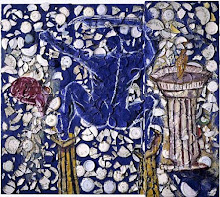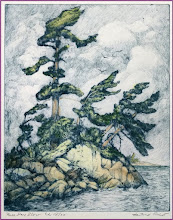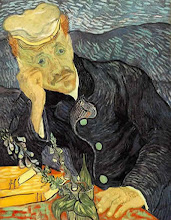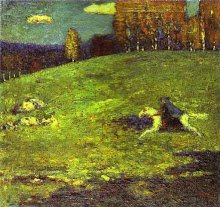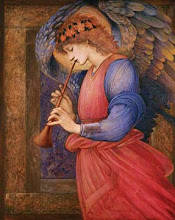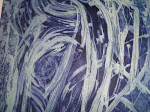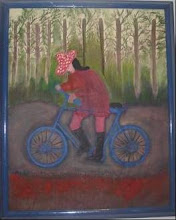The painted metal bluebird pin has nested in a back corner of my jewelry box for more than twenty years, and for many a spring, I have considered getting rid of it. Simplify, simplify, simplify, Thoreau counseled, long before self-help books made their authors rich with titles like Give Away 50 Things This Year. I never wear this bluebird pin, never use it to pin a scarf together or brighten up the lapel of a jacket, not being the type to wear animal pins on scarves or coats, as women of my mother’s and grandmother’s generations did. My bluebird pin is hammered neither of 14 nor 18-karat gold and boasts no lapis eye or pearl-crested beak. It’s sitting in a pocket of seed-pearl dust motes among a tangle of its costume jewelry cousins: a silver ankle bracelet with dangling miniature bells, a galloping horse-and-rider pendant long since separated from its chain, a turquoise necklace with cracked stones and busted clasp.
The bluebird pin was a birthday present from my father’s longtime companion who, for all intents and purposes, is my stepmother even though my father and she never married, both being survivors of divorces and unwilling to fly again into what Montaigne called the “cage of marriage.” My stepmother gave me the pin sometime in the first years after my first husband died, explaining that “the bluebird of happiness” was a symbol of hope and renewal. I wasn’t much for cheering up in those days, feeling a bit like Woody Allen, who said, “Early in life, I was visited by the bluebird of anxiety.” And so I wrote her a thank you note, and tucked the pin away in a corner of the split-level floral jewelry box, where it slept, like a drugged princess in a fairy tale, for the next two decades.
Then I began work on The Blue Hours of Middle Life, and discovered that things that had hitherto held little interest suddenly demanded my attention. Grateful that I hadn’t given away the bluebird pin, I rescued it from the jewelry box, stuck it in an inner pocket of my purse, and began to ponder its beloved particularity. Why the bluebird of happiness, as opposed to the blue fish of happiness or the blue dog of happiness? I am not a birder, and know next to nothing about bluebirds, except that they are not to be confused with blue jays. I therefore took myself to Google and learned that the bluebird, an insectivorous member of the thrush family, comes in three varieties in North America: the Eastern Bluebird, the Western Bluebird, and the Mountain Bluebird, which is almost completely bright blue. As with many other species, the male bluebird is the bright one, who “carries the sky on its back” as Thoreau poetically described him, and the female is mud-colored. All bluebirds are cavity-nesters, and their nests are often destroyed by starlings, sparrows, and crows, as well as snakes, cats, and raccoons, who could care less that the bluebird is the bearer of happiness, and think nothing of smashing its tiny blue eggs.
The bluebird is considered sacred by many Native American tribes. In the Cochiti tribe, the firstborn son of the Sun was named Bluebird. The Navaho also associate the mountain bluebird with the rising sun and even have a song about him which they sing to wake sleeping tribe members: “Bluebird said to me, /’Get up, my grandchild. /It is dawn,’ it said to me.” In more recent times, musicians such as Cole Porter and Irving Berlin have written popular songs celebrating bluebirds: “Be like the bluebird who never is blue,” wrote Cole Porter, “For he knows from his upbringing what singing can do.”
On Daylight Savings' morning, I woke with bluebirds dancing in my head, and hurried off to the early service at UU, which was led by the youth group and devoted to the subject of happiness. Bluebirds did not feature in any of the music or readings, but I had the pleasure of listening to my friend’s seventeen-year-old daughter, Liz, deliver one of the three sermons. I have known Liz since she was smaller than a bluebird’s egg in her mother’s womb—in fact, her mother, Pat, and I were residents at Byrdcliffe Art Colony in Woodstock, New York, when Pat discovered she was pregnant—so I felt privileged and proud to be sitting in a front pew, marveling at the poise of this lovely, brown-eyed girl who recalled her own moments of happiness and defined the condition as that state of mind in which one is entirely present, free from the past or future, free from ambiguity or conflict.
But the bluebird of happiness is, by definition, flighty, and so I returned home, only to be ragged on by my husband for not removing my muddy sneakers when entering the house. (In fairness, he had spent the previous afternoon vacuuming.) I grumbled for five minutes, then put on a pair of house slippers. Then, in a series of truly lame events, I jumped on my bed to open the curtains, then leapt off with equal enthusiasm (I suppose I was trying to recapture my earlier UU bliss) and landed smack on my left ankle, which has long been weakened from a sprain sustained as a teenager when leaping over a tennis net. I howled. And howled. My husband came running with an ice pack and instructions to keep my foot elevated. The ankle swelled to the size of a tennis ball.
Three days later, killing time before picking up my son at school, I was limping around Barnes & Noble, my ankle still throbbing despite the ace bandage I had wrapped around it. In the Women’s Studies section, I noticed a small hardback book called Bluebird, its front cover displaying a blue glass bird. It seemed that the book had been written and packaged just for me. Like a greedy jay attacking a mound of sunflower seeds in a feeder, I grabbed Bluebird: Women and the New Science of Happiness, and carried it to the café in the front of the store. I settled at a table with a coffee, and began to read.
I learned that happiness studies was the hot new field in psychology, and that researchers hoped to define the conditions that cause happiness just as they had isolated the conditions that caused depression. I learned some fairly obvious things: that the things we think will make us happy usually don’t (winning the lottery, buying a bigger house, purchasing a new car), and that the little experiences that we don’t pay much heed to (a child’s smile at the breakfast table, the shades of aquamarine in the sky during the blue hour, the sound of crickets on a summer’s night) make us surprisingly happy, lighting up the left prefrontal cortexes of our brains. Most people, happiness researchers have discovered, possess a “set point of happiness,” which is surprisingly immune to external physical conditions, which explains why someone like Helen Keller could be happy as a clam and Paris Hilton could end up in rehab.
Happiness comes from the root Norse word, hap, which also means luck, but happiness is actually a practice, which can be learned and cultivated by engaging in such daily activities as doing meditation and keeping a gratitude journal. I fished out the notebook I always keep in my purse and copied down a quote from Man’s Search for Meaning, a book that I once read religiously as a morose teenager but hadn’t picked up in years. “Everything can be taken from a man but one last thing,” writes Victor Frankl in his account of his years in Auschwitz, “the last of the human freedoms, to choose one’s attitude in any given set of circumstances, to choose one’s own way.”
As I wrote, I was engaged in what happiness mavens call "flow," the process by which one achieves a temporary bliss by forgetting oneself. But I reverted to my set point of grumpiness when I realized that I had browsed through most of the book, and come across not a peep about bluebirds. Returning Bluebird to its shelves, I felt a shiver of Kantian-style guilt: if everyone read books they never bought, our economy, already limping along like a bird with a broken wing, would crash.
The next morning, I was picking at the crusty top of a pistachio muffin in the Donut Man, writing as fast as I could on my laptop before I had to ride my bike home,jump in the car, and drive to Gill to pick up the little boy that I take care of three days a week. A group of elderly ladies noisily approached the table next to me, all white-haired and in various states of creeping decrepitude, one bent like a broken branch over her walker, another hooked up to a portable oxygen tank. I was half-overhearing their conversation, which was about the recent illness of one of their friends, who had been in and out of Bay State Hospital.
Then three of the ladies went off to order their coffee, leaving the one with the walker alone in the booth. She smiled in my direction and I smiled back just enough to be polite but not too much because I really wanted to finish what I was writing. Then she asked if that was my bicycle chained up out front, and I said that it was, and she began a long-winded anecdote about how she had seen another blue bike in Belchertown yesterday and it couldn’t have been mine, could it? Because that’s a long way from here, and surely I didn’t ride that far? I replied, more curtly than I intended, that it must have been a different bike.
Her companions returned, bearing foam cups of steaming coffee, plates of rainbow-speckled and chocolate-frosted donuts, and rescuing me from further chitchat. Their talk turned to the upcoming warm weather, which was to be in the mid-sixties and none of them were complaining because they had had quite enough of winter. Then one said, “Spring’s early this year, I saw a bluebird yesterday.”
“Sorry for interrupting, but did you say bluebird?” I asked. The old woman, so massive she took up most of the wooden booth, nodded vigorously, her broad face reminiscent of an aging Cabbage Patch doll.
“Can I ask where you saw it?” I asked.
“Just a few miles from here, up in North Hadley,” she said.
“That’s so cool. I was just writing about bluebirds,” I explained, looking sheepishly in the direction of the woman with the walker, who smiled at me beatifically, as if it wouldn’t occur to her to hold it against me for my previous rudeness.
All these ladies knew their bluebirds, and the one with the walker explained how she and her husband had once built bluebird boxes in their backyards, and that one of their favorite things had been to linger over breakfast and watch the bluebirds at the feeder. He was gone now, but whenever she saw a bluebird, she always thought of him.
Then I noticed the time, and said I was sorry but I had to run. I thanked them for sharing their stories, then packed up my laptop. They warned me to be careful on the bike, and I promised I would.
Before heading home, I searched in my purse to check on the bluebird pin (I can be absent-minded, and I did not want to lose this now-precious object). Then I whispered what Meister Eckhart called the only prayer one ever needs: "Thank you!"
Introducing Frida von Zweig
3 years ago
